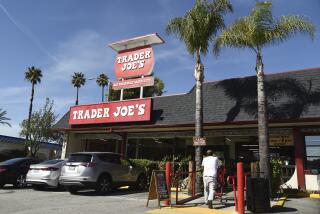Why Dole Offers More Than Just a Bit of Appeal
- Share via
Rumors about depressed banana prices have sliced 15% off Dole Food Co.’s stock in recent weeks. Some of the company’s fans believe that that has created a golden opportunity to buy the shares on the cheap.
Bananas are a big business for Westlake Village-based Dole, formerly Castle & Cooke Inc. The company ships more than 60 kinds of fresh fruits and vegetables to consumers in more than 50 countries, but analysts figure that no single produce item is as important to Dole as bananas.
Price worries began last month, centering on Dole’s top competitor, Cincinnati-based Chiquita Brands. Some analysts suggested that banana prices in some markets were down 50% from 1990 because of oversupply and weak demand.
That talk has knocked Chiquita shares from $50 early in September to $43.25 now, and pulled Dole down from $48 to $41 as of Thursday.
What’s wrong with bananas? Nothing unusual, most analysts say. Demand always weakens in summer and fall because bananas have to compete with the bounty of summer-harvest fruits.
In 1990, however, the seasonal effect was mitigated in the third quarter because of supply disruptions (a strike against Chiquita in Honduras) that kept banana prices up. That, and the opening of Eastern European markets, allowed Dole to book better-than-expected results a year ago.
This year, with supply back to normal and prices down, some traders figure that third-quarter earnings at Chiquita and Dole will look awful versus last year--hence the drop in the stocks.
Ron Baron, money manager at Baron Capital Inc. in New York, doesn’t buy it. Checking banana prices, he finds that the typical 40-pound box has traded between $8 and $12 in recent months. That’s a lower range than a year ago but nowhere near the 50% drop some traders have rumored.
Baron says investors also may be forgetting that Chiquita and Dole book their banana profits differently. Chiquita takes all its profits when they occur, mostly in the first half of the year. So its second-half earnings always are minuscule.
Dole spreads its banana profits over the entire year, an accounting technique that allows the firm to “manage” its results quarter to quarter. In fact, one rumor making the rounds is that Dole will be sure its third-quarter numbers look good, so that archrival Chiquita’s slim results look doubly bad. (Dole won’t discuss quarterly results and mostly refrains from talking at all about business.)
Craig Silvers, an analyst at Crowell, Weedon & Co. in Los Angeles, has cut his third-quarter earnings estimate for Dole to 95 cents from $1.05 because of banana-price concerns. But even the new estimate is 28% higher than the 74 cents a share Dole earned in the third quarter of 1990. Growth is being paced by the company’s rapidly expanding line of fruit, vegetables and packaged fruit and juice products worldwide. In an economy where few companies are reporting any earnings gains, Dole should look very good.
What’s the stock worth? At $41, it’s priced at just 13 times the $3.10 a share or so that analysts expect Dole to earn next year. Given the world’s growing demand for healthful stuff like fresh fruit, Dole has the markings of a 1990s growth stock. In fact, Chairman David Murdock--an ever-opportunist who put the food division up for sale a year ago, then wisely changed his mind--has said that a 15% growth rate is likely for the next few years at least.
What’s more, the company’s real estate operations--housing developments in California and Hawaii plus new hotel-resorts on Hawaii’s Lanai Island--aren’t contributing much to earnings because of the weak economy and start-up costs. Wall Street has all but forgotten about that part of Dole, since food products accounted for more than 90% of the firm’s $3 billion in revenue last year.
Richard Strong of Milwaukee’s Strong Funds, a longtime Dole share owner, values Dole’s food operations alone at nearly $50 a share. At the stock’s current price, he says, “You’re getting those Hawaiian properties for nothing.”
The Treasury Calls a Bond: The U.S. Treasury shocked some investors Wednesday by announcing that it will exercise a “call” provision on one of its bonds. A T-bond issued at 7.5% in 1973 and expected to mature in 1993 will instead be paid off next February, the government said. By refinancing the bond early, the government expects to save $18 million in interest expense, thanks to lower rates. Unfortunately for the bondholders, who counted on that 7.5% yield through 1993, they’ll get their money back early.
If you own Treasury bonds, don’t worry that Wednesday’s bond call is going to become a trend. Over the last two decades, relatively few T-bonds were issued with provisions that allow early payoffs. In fact, no T-bonds issued since 1985 permit early calls. If a bond wasn’t issued with a call option built in, the Treasury must honor it to the stated maturity, no matter how high the yield.
Even investors who bought callable long-term T-bonds yielding 12% or more in the early 1980s don’t have anything to worry about for quite a while: Most of those bonds can’t be called before the year 2000.
The next T-bond issue likely to be called is a 7% bond maturing in 1998 but eligible for a call in 1993.
Misguided Sellers at Dole?
Shares of dole Food Co. have tumbled about 15% since early September on concerns about falling banana prices. But many analysts say the banana trend will have little effect on Dole’s earnings and that the stock selloff has created a buying opportunity.
Weekly NYSE close, except latest
Thursday close: $41.00
More to Read
Inside the business of entertainment
The Wide Shot brings you news, analysis and insights on everything from streaming wars to production — and what it all means for the future.
You may occasionally receive promotional content from the Los Angeles Times.






